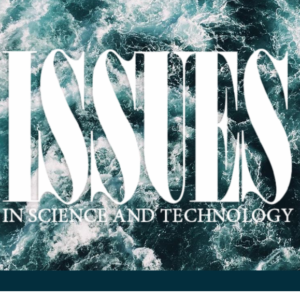Ten years ago, the Deepwater Horizon oil rig exploded and sank in the Gulf of Mexico, triggering the largest marine oil spill in history. Marcia McNutt was the director of the US Geological Survey at the time. She led the agency’s response efforts and helped bring the disaster to an end. Now the president of the National Academy of Sciences, she is again leading the response to a major catastrophe—this time to the coronavirus pandemic.
Her experience with the Deepwater Horizon spill informs her thinking on the special role of science in a crisis. As she writes in a new article for Issues in Science and Technology, delivering actionable, strategic, and irreplaceable science will help the research enterprise confront COVID-19. Employing this kind of science will not only assist in developing a vaccine and therapies, but support a stronger and more resilient nation and world.
Issues in Science and Technology is a quarterly journal published by the National Academies of Sciences, Engineering, and Medicine and Arizona State University. The journal is a forum for discussion of public policy related to science and technology. Sustainability scientist Dan Sarewitz is editor-in-chief.
